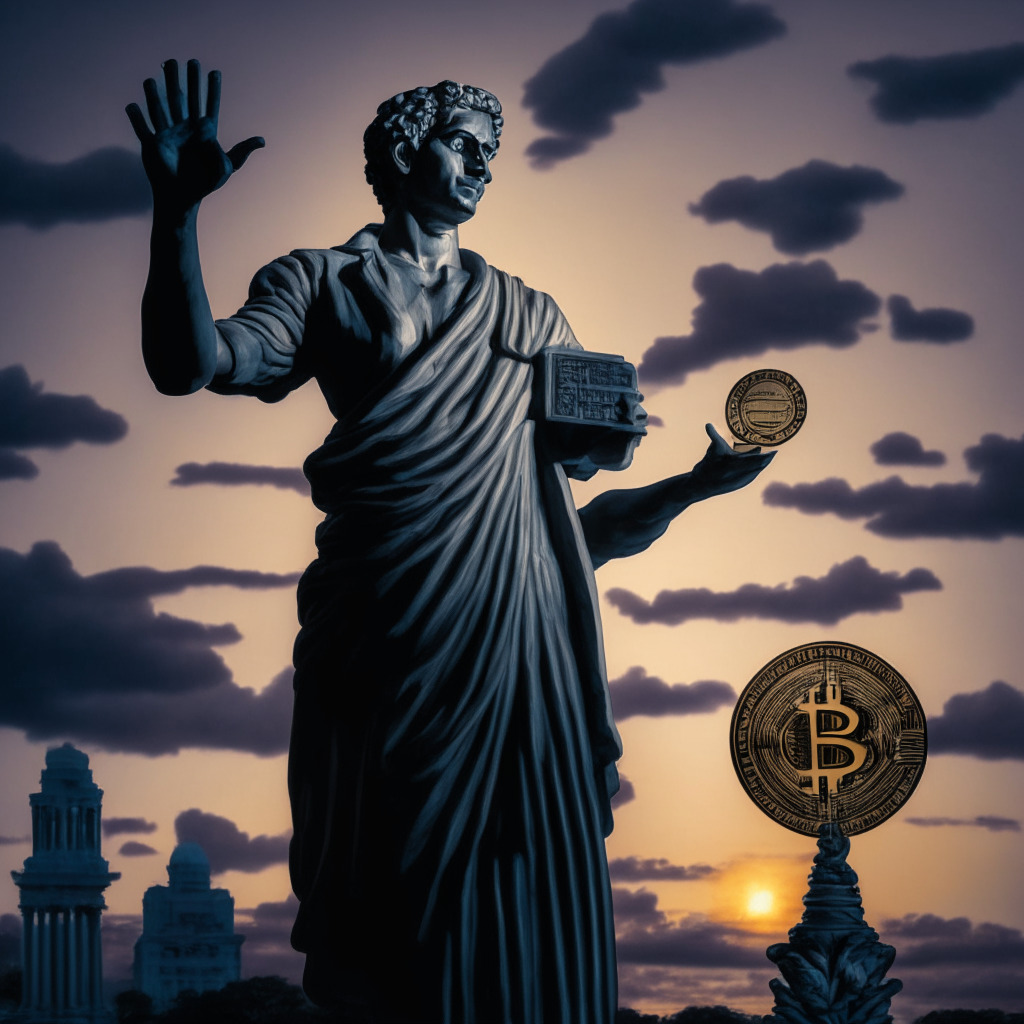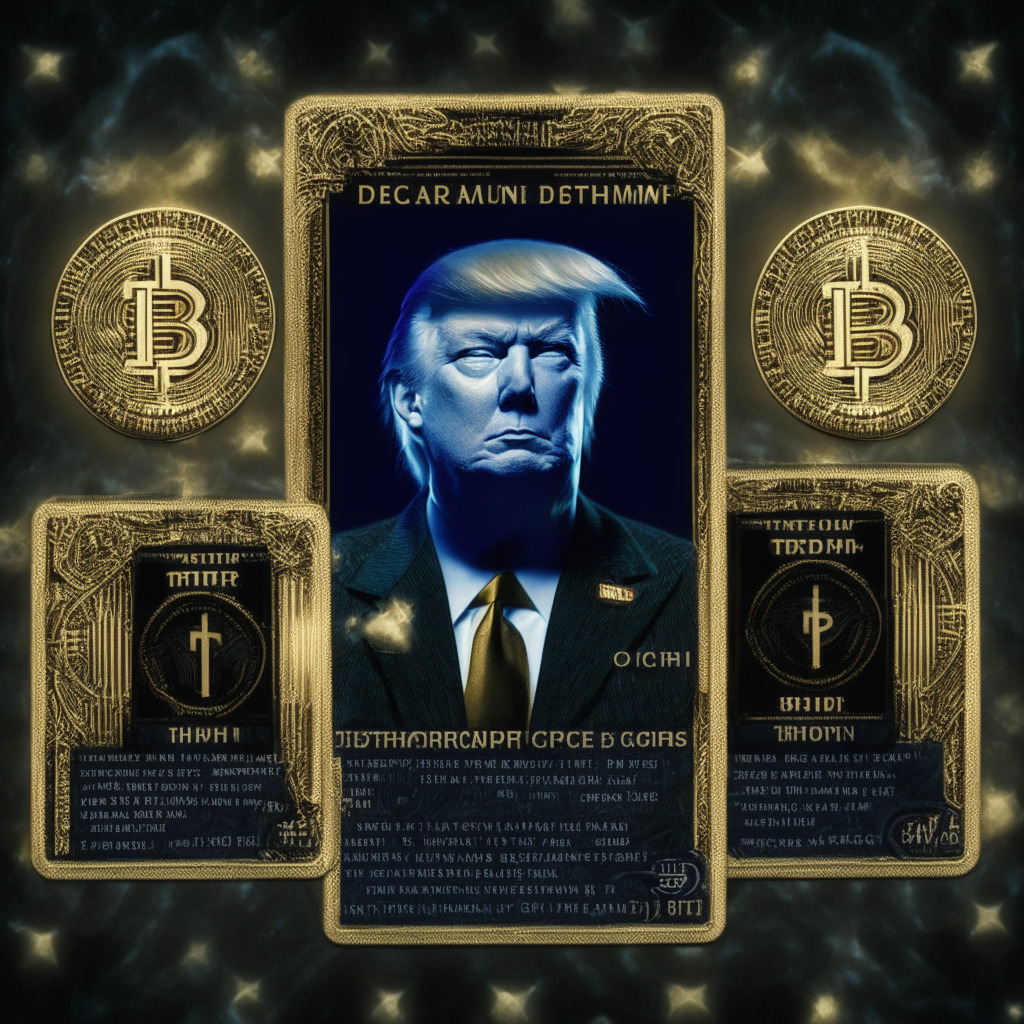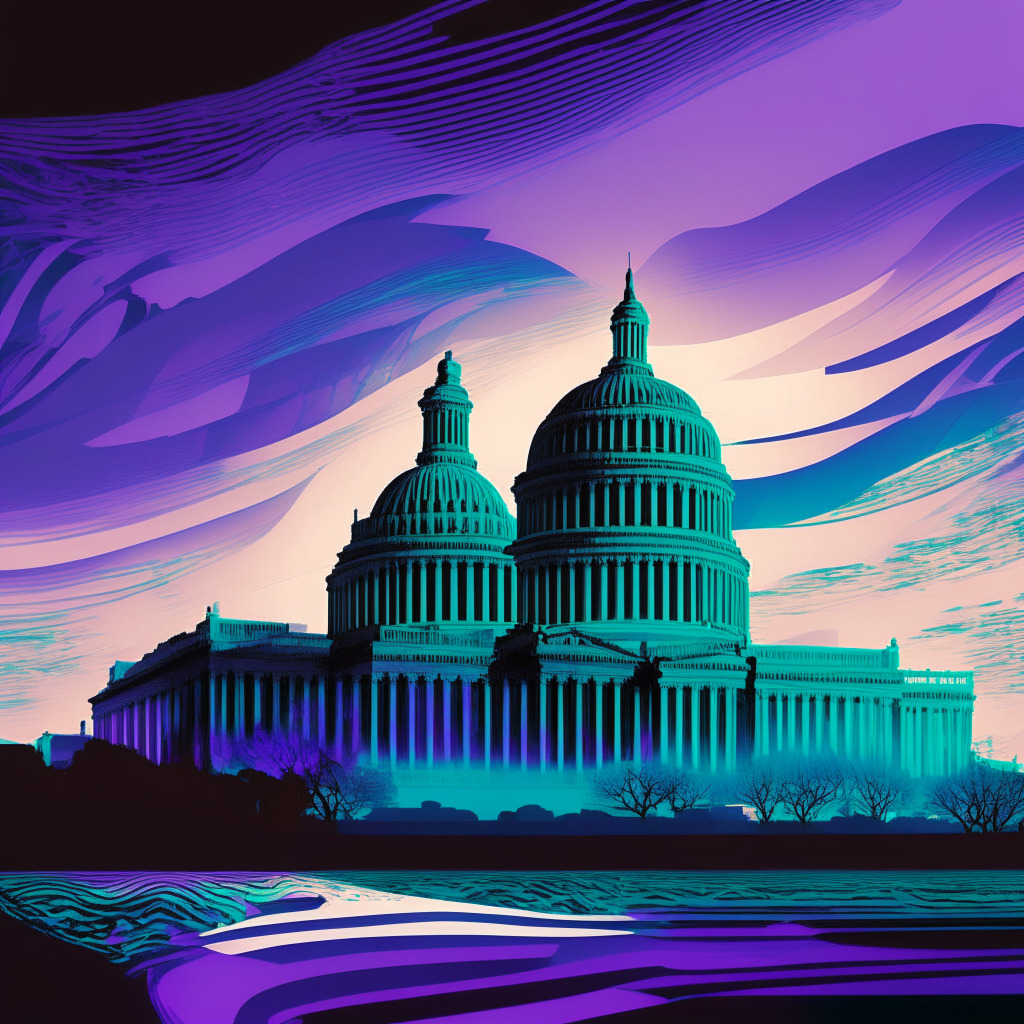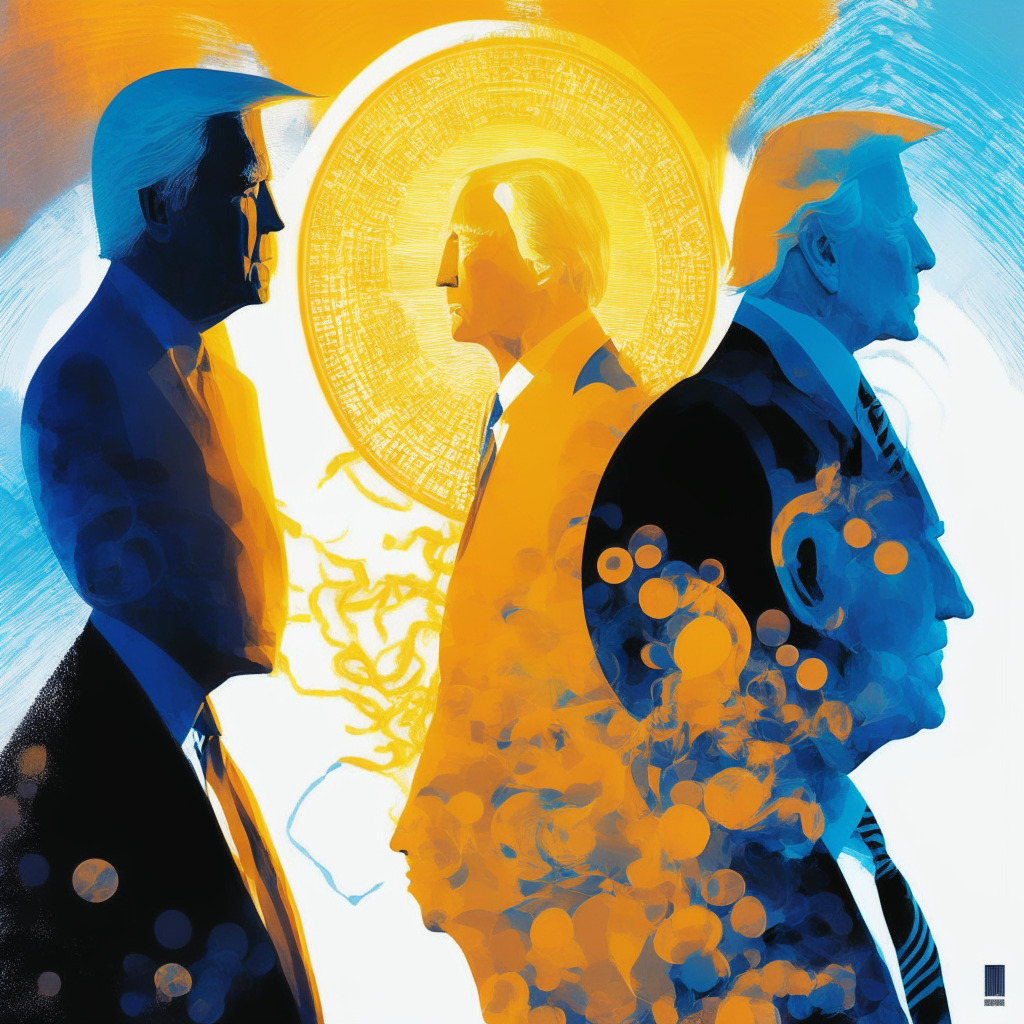Republican Presidential candidate Vivek Ramaswamy perceives Grayscale Investments’ recent courtroom victory over the SEC as a critical defense for blockchain and Bitcoin innovation in the U.S. He plans to rollback federal regulations that hinder the growth of crypto markets if they don’t meet Supreme Court tests, while criticizing the contentious approach of regulation by enforcement preferred by the SEC.
Search Results for: Republican
Ramaswamy’s Support and Regulatory Challenges: Unraveling the Future of Cryptocurrency in the US
“U.S. Presidential candidate Vivek Ramaswamy praised Grayscale’s victory over the federal securities regulator, asserting it could further Bitcoin and blockchain innovation. However, the legal landscape for cryptocurrency regulation remains complex and uncertain, despite support from industry influencers and active discussions for clear regulations.”
SEC’s Crypto Regulation Approach: A Stepping Stone or Stumbling Block?
Gary Gensler, the SEC Chairman, is facing criticism from lawmakers for his aggressive stance on crypto regulation lacking transparency. The SEC’s focus on enforcement and penalties, absent clear guidelines on crypto assets within its jurisdiction, has come under scrutiny. Furthermore, differing views on regulatory approach, particularly regarding potential links between Prometheum and Chinese entities, have led to questioning of the SEC’s approval procedures. As Gensler prepares to return to Capitol Hill, debates on cryptocurrency policy will intensify, with calls for a cohesive, clear, routine for regulating this sector.
Grayscale’s Victory Stirs Up Controversy: Doubts Over SEC’s Gensler Heighten
“Cryptocurrency circles discuss Grayscale’s lawsuit and SEC chair Gary Gensler’s role. Congressman Warren Davidson suggests Gensler’s SEC decisions lack stead, as demonstrated by Grayscale’s legal victory. This opens up possibilities for a Bitcoin spot ETF emergence in the US, but the situation remains uncertain.”
Miami’s Blockchain Mayor Bows Out: What Suarez’s Presidential Campaign Suspension Means for Cryptocurrency Future
“Suarez, Miami’s Mayor, known for his bitcoin-friendly stance, accepted bitcoin as campaign donation and has explored the use of blockchain technology. Despite facing challenges, his pursuit of these technologies prompts discussion on the role of digital currencies in future political campaigns and public administration.”
Shackles or Safeguards? Federal Reserve’s Crypto Oversight Fuels Global Expansion
The Federal Reserve’s intensified scrutiny of banks’ cryptocurrency activities has sparked criticism from Republican lawmakers who argue this deters institutions from participating in the digital asset landscape. The Fed’s new requirements may potentially suppress the progress of decentralized finance. Amidst this, U.S. regulations on digital assets remain unclear, pushing some crypto companies to explore alternative markets overseas. The discourse focuses on balancing effective supervision with fostering blockchain innovation.
Crypto Regulation: Candidates’ Stances and Upcoming Election Implications
“Crypto regulation has become a significant issue in U.S. presidential campaigning. Candidates’ positions vary widely, from skepticism to enthusiastic adoption, yet the subject of digital assets regulation was absent from the recent Republican debate. This highlights the increasing importance of cryptocurrencies in our socio-political landscape, and suggests a need for informed legislation.”
Surge in Blockchain Betting Forecasts a Potential Dark Horse in 2024 Presidential Race
“Bitcoin-friendly entrepreneur Vivek Ramaswamy emerges as a formidable contender in the 2024 U.S. Republican presidential nomination. Blockchain-based betting platforms indicate his growing popularity, signifying possible cryptocurrency and blockchain acceptance in political scenarios. Though legally limited, this technology may revolutionize gauging public sentiment.”
Blockchain Based Prediction Markets: A Glimpse into the Future of Political Betting
“Blockchain-based prediction markets like Polymarket are gaining momentum as an alternative indicator for political outcomes. Despite their contested legal status, they offer unique insight into public sentiment, recording shifts in standing following events like debates. Fueled by millions in bets, these platforms may set records this election cycle, despite potential regulatory hurdles.”
Crypto Politics: A Game-Changer in the 2024 US Elections Pros and Cons
“Crypto is becoming a vital topic in the US electoral campaign, with notable enthusiasts Governor Ron DeSantis and Vivek Ramaswamy promoting a future centered on digital currencies. Both forecast a future where digital assets disrupt traditional finances, shaping blockchain’s future.”
SEC’s Anticipated Approval of Ether Futures ETFs: A Leap or a Stumble for Crypto?
The SEC’s expected approval of multiple Ether futures ETFs signals a significant shift in crypto regulation. However, with the potential risk posed to individual investors by crypto volatility, the outcome remains uncertain. The decision sets the stage for an exciting and transformative year for the crypto industry amidst intense discussions about the impact on the sector and investors.
Presidential Hopeful Vivek Ramaswamy Banks on Crypto: Innovating Campaign Funding or Legal Liability?
“Up-and-coming US Republican presidential candidate, Vivek Ramaswamy, known for his pro-crypto stance, is accepting Bitcoin contributions for his campaign, reflecting the increasing influence of digital currencies in the financial landscape. However, his political journey faces potential setbacks due to legal issues with previous employees.”
Uncovering the Political Bias in AI Chatbots: A Deep-Dive into OpenAI’s ChatGPT
“AI chatbot, ChatGPT, developed by OpenAI, has shown a tendency towards left-leaning responses in its discussions of political issues. The emission of bias might be a result of biased training data or the algorithm itself. Although AI brings advancements, biases and security concerns must be mitigated for safe adoption.”
Secret Cryptography: Trump’s Hidden Digital Assets Stir Presidential Crypto Debates
Former US President Donald Trump reportedly holds $2.8 million in a digital wallet, a larger sum than previously disclosed. Trump’s venture into the crypto domain began with his NFT endeavor, Trump Digital Collectible Cards. The discovery shows his deepened involvement in cryptocurrency. Meanwhile, other presidential candidates voice their crypto policies, underlining the rising influence of cryptocurrencies on the political stage.
The Ripple Effect of PayPal’s PYUSD: Potentially Forcing a Shift in Stablecoin Regulation Debate
The launch of PYUSD, a stablecoin backed by PayPal with over 430 million users, may accelerate crypto adoption and prompt a shift in U.S. policy towards crypto regulation. Despite previous hesitations, the massive user base might force lawmakers to urgently develop a comprehensive regulated framework for stablecoins, heralding a new era of American crypto companies demanding inclusion in economic life.
Navigating the Uncertainties: Unraveling the Bitcoin ETF, Regulatory Glitches and BTC Market Volatility
The US SEC’s delay on verdicts for Bitcoin ETF filings, coupled with Europe’s first Bitcoin ETF launch, creates uncertainty in the crypto market. Amidst this, Bitcoin Depot reports Q2 revenue growth. However, market apprehension, resulting from potential changes in crypto regulations, impacts BTC’s value, leading to a bearish climate and potential downward trend.
The Fall of FTX: Lawsuits, Allegations and a New Era for Blockchain Regulation
“The former FTX CEO, Sam Bankman-Fried, faces allegations of campaign finance law violations, part of a wire fraud scheme. He’s accused of embezzling customer’s deposits, using over $100 million to influence cryptocurrency regulation by making campaign contributions. The ongoing legal trials highlight the blurred lines between digital assets and legal boundaries.”
Bipartisan Crypto Support: Accelerating Adoption or Facing Opposition?
“Cryptocurrency finds itself adopted by parties on both sides of Washington’s political divide, evolving from being a niche technology to a politically intriguing topic. Coincidentally, support seems almost equal, with 26 Republicans and 22 Democrats in the House, and 24 Republicans and 11 Democrats in the Senate advocating for crypto. Criticism exists too, demanding more transparency and protection of traditional institutions.”
Bitcoin-Backed ETF Approval: Political Climate’s Influence and the 2024 Election Saga
“Former SEC official, John Reed Stark indicates that a spot Bitcoin-backed exchange-traded fund (ETF) approval in the US is unlikely in 2023, due to multiple considerations held by the current SEC. Crypto-friendly regulations and the approval of a Bitcoin spot ETF, might be more feasible with a Republican-led Administration and SEC Commissioner after the 2024 elections.”
Former President Trump’s Surprising Foray into Cryptocurrency and NFTs: A Paradigm Shift or Sheer Opportunism?
“Former US President Donald Trump reportedly owns digital assets worth between $250,000 and $500,000, largely boosted by sales from his NFT trading cards. This comes despite previous comments disparaging cryptocurrencies. Trump’s decision amidst divisive views on digital assets could potentially influence the upcoming White House bid for 2024.”
Future of Bitcoin Spot ETFs: Pending Regulations and Political Influence’s Role
“Former SEC dignitary John Reed Stark speculates that the approval of Bitcoin Spot ETFs may be improbable due to regulatory hurdles. Despite Bitcoin price fluctuations, Stark believes a shift in political power towards Republicans could favor the crypto industry, potentially easing regulatory constraints and focusing more on fraudulent activities rather than registration violations. A move that could see Hester Pierce – ‘Crypto Mom’ – ascend the ranks, advocating for more crypto-friendly regulations.”
Shifting Political Winds: Potential Impact on US Crypto Regulatory Landscape Post 2024 Election
Recent comments from former SEC official John Reed Stark suggest potential changes to U.S. crypto regulation influenced by party politics. Stark attributes a pro-crypto regulation shift to a possible Republican win in 2024, ending current SEC chair Gensler’s tenure, and potentially paving the way for Hester Peirce, known for her softer stance on crypto.
The SEC’s Crypto Crackdown: Necessary Oversight or Innovation Barrier?
“Bittrex agreed to a $24 million settlement following SEC allegations of operating as an unregistered securities exchange, part of an acceleration of SEC’s enforcement on disruptive crypto firms. The aggressive regulation is critiqued for thwarting investment and innovation, pushing the industry to more amiable jurisdictions like UAE or UK.”
Central Bank Digital Currency: A Financial Freedom Foe or Decentralized Ally?
Joe Rogan and Post Malone voiced skepticism about US central bank digital currency (CBDC), seeing it as potentially enabling government control over individual finances. This controversy, along with alternatives such as decentralized cryptocurrencies, forms a pivotal part of ongoing discussions about the future of digital currencies.
The Clash Over PayPal’s Stablecoin: Balancing Innovation and Regulation
“The U.S. House Financial Services Committee offers contrasting viewpoints on PayPal’s U.S. dollar-pegged stablecoin, PYUSD. While Rep. Maxine Waters expresses concern about regulatory oversight, Rep. Patrick McHenry proposes potential in its development. The struggle between fostering innovation and ensuring safety shows the complex challenges of the crypto industry.”
PayPal’s PYUSD: Stepping Stone or Stumbling Block for Blockchain’s Future?
“The recent launch of PayPal’s dollar-backed stablecoin, PYUSD, has incited controversy due to the lack of Federal regulation in this domain. Some see this as undermining the Federal Reserve’s role, while others view it as stepping stone to a modern payment system. The overarching consensus is the imperative need for a clear regulatory framework in the realm of cryptocurrencies.”
Venture Capital Giants Faced with Lawsuit over Crypto Exchange Scandal: Unmasking their Role
“In a class-action lawsuit, 18 top venture capital firms, including Temasek, Sequoia Capital, Sino Global and Softbank are accused of endorsing the apparently bankrupt crypto exchange, FTX. The plaintiffs argue they portrayed a deceptive picture of safety and stability about the exchange, despite concerns of fraudulent activities and negligence of securities laws.”
The Great Swindle: FTX’s Co-CEO’s Guilty Plea and Its Fallout on Crypto Transparency
Former co-CEO of FTX Digital Markets, Ryan Salame, is expected to plead guilty to suspected violations of U.S. campaign finance laws linked with illicit activities within the cryptocurrency firm. Sam Bankman-Fried, FTX founder, maintains his not guilty plea against charges including multi-billion dollar fraud. This underscores the urgent need for transparency in financial cyberspace.
FTX Digital Markets Scandal: The Tightrope of Crypto Regulations & Need for Decentralization
“FTX Digital Markets’ co-director, Ryan Salame, is negotiating a potential guilty plea regarding criminal charges stemming from the downfall of the cryptocurrency exchange. Salame is accused of violating campaign finance laws, posing questions about the future of blockchain technology and the need for stringent regulations within the platform.”
PayPal’s Venture into Stablecoin: A Game-Changer or Just Another player?
PayPal Holdings Inc. plans to launch an exclusive US dollar-backed stablecoin, PayPal USD (PYUSD), intending to change the way stablecoins are used in daily transactions. Amid uncertainty over stablecoin regulations, many hope that PayPal’s entry could be a game-changer for the sector’s growth and investor confidence.
2024 U.S. Presidency & Crypto: Favouring Central Bank Digital Currencies or Upholding Bitcoin?
“According to Grayscale, presidential candidates Joe Biden and Donald Trump might support the development of central bank digital currency (CBDC), despite their unclear stance on Bitcoin. Other candidates have expressed both support for cryptocurrencies and opposition to CBDCs. Amidst this, regulatory uncertainty tests the resilience of crypto firms and generates various views about the future of cryptocurrencies.”
Stablecoin Bill Approval: Bipartisanship Triumph or Political Posturing?
The recent passing of the stablecoin bill in the House Financial Services Committee highlights ongoing political tension in Washington. Despite initial bipartisan support, the bill stands as a glaring representation of political unity’s failure, caught in the crossfire of political maneuvers, with even well-intentioned legislation teetering on the edge of oblivion.































